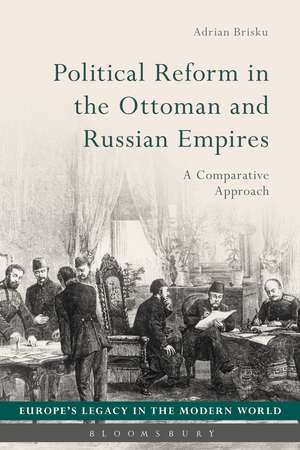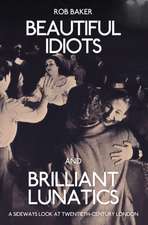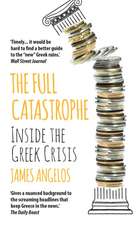Political Reform in the Ottoman and Russian Empires: A Comparative Approach: Europe’s Legacy in the Modern World
Autor Dr Adrian Briskuen Limba Engleză Paperback – 20 mar 2019
| Toate formatele și edițiile | Preț | Express |
|---|---|---|
| Paperback (1) | 231.63 lei 6-8 săpt. | |
| Bloomsbury Publishing – 20 mar 2019 | 231.63 lei 6-8 săpt. | |
| Hardback (1) | 716.15 lei 6-8 săpt. | |
| Bloomsbury Publishing – 20 sep 2017 | 716.15 lei 6-8 săpt. |
Preț: 231.63 lei
Nou
Puncte Express: 347
Preț estimativ în valută:
44.32€ • 46.43$ • 36.73£
44.32€ • 46.43$ • 36.73£
Carte tipărită la comandă
Livrare economică 08-22 aprilie
Preluare comenzi: 021 569.72.76
Specificații
ISBN-13: 9781350105560
ISBN-10: 1350105562
Pagini: 272
Dimensiuni: 156 x 234 x 17 mm
Greutate: 0.39 kg
Editura: Bloomsbury Publishing
Colecția Bloomsbury Academic
Seria Europe’s Legacy in the Modern World
Locul publicării:London, United Kingdom
ISBN-10: 1350105562
Pagini: 272
Dimensiuni: 156 x 234 x 17 mm
Greutate: 0.39 kg
Editura: Bloomsbury Publishing
Colecția Bloomsbury Academic
Seria Europe’s Legacy in the Modern World
Locul publicării:London, United Kingdom
Caracteristici
Offers a unique comparison of Ottoman and Russian politics of reform and their connection to the wider European politico-economic space
Notă biografică
Adrian Brisku is Lecturer in history at Charles University in Prague, Czech Republic. He is the author of Bittersweet Europe (2013).
Cuprins
Introduction Part I: Men versus Institutions: Law and Religion 1. Quests for Fundamental Change: 'True Monarchy' and the 'Holy Alliance' 2. 'Alternation and Complete Renewal of Ancient Custom': An Unattainable Pledge Part II: Managing the Future: From Law to Political Economy and Political Representation3. Empire and Progress 4. A Constitutional Empire Epilogue, From Reform to Revolution: Imperial Core in Turmoil BibliographyIndex
Recenzii
[A] highly readable comparative account of the ultimately unsuccessful trajectories of political reform in the Ottoman and Russian Empires . [A] good introduction to students and nonspecialists seeking to learn the basic narrative and gain some comparative insight into top-down reform projects in the nineteenth century.
This is an excellent, original, and comprehensive study of the Ottoman and Russian states' efforts, mainly in the nineteenth century, to assure the survival of their countries and revitalize their societies through a series of legal-administrative reforms . I recommend Brisku's book highly to students of Russia and the Ottoman Empire.
By virtue of demonstrating the benefits of theoretical and methodological reflection in historiography, as well as providing a groundwork on which further comparative and integrative research can be built, Brisku's work stands as a valuable contribution to the literature.
In this innovative effort, Brisku has succeeded in portraying two societies in near constant war with each other ... A good read, offering a window into a part of the world still preoccupied with the purity of the nation and busy reconstructing a mythical people and the blessing of God under increasingly tyrannical rule.
Original and novel work... [which is] commendable.
Through a detailed and deeply theoretical investigation of nineteenth-century reform processes in the Ottoman and Russian Empires, Adrian Brisku offers a ground-breaking and thought-provoking framework for the emerging field of comparative Ottoman and Russian imperial studies.
Adrian Brisku's masterful comparison of two 'peripheral' European Empires, Russia and the Ottoman Empire, during political reforms of the 19th c. produces a vivid and personalized account of two high civil servants whose attempts at establishing a nascent constitutional order were met with swift failure. Brisku's genius stroke is to make us rethink institutions, constitutions and the tension between change and stability in large, multi-ethnic polities.
This is an excellent, original, and comprehensive study of the Ottoman and Russian states' efforts, mainly in the nineteenth century, to assure the survival of their countries and revitalize their societies through a series of legal-administrative reforms . I recommend Brisku's book highly to students of Russia and the Ottoman Empire.
By virtue of demonstrating the benefits of theoretical and methodological reflection in historiography, as well as providing a groundwork on which further comparative and integrative research can be built, Brisku's work stands as a valuable contribution to the literature.
In this innovative effort, Brisku has succeeded in portraying two societies in near constant war with each other ... A good read, offering a window into a part of the world still preoccupied with the purity of the nation and busy reconstructing a mythical people and the blessing of God under increasingly tyrannical rule.
Original and novel work... [which is] commendable.
Through a detailed and deeply theoretical investigation of nineteenth-century reform processes in the Ottoman and Russian Empires, Adrian Brisku offers a ground-breaking and thought-provoking framework for the emerging field of comparative Ottoman and Russian imperial studies.
Adrian Brisku's masterful comparison of two 'peripheral' European Empires, Russia and the Ottoman Empire, during political reforms of the 19th c. produces a vivid and personalized account of two high civil servants whose attempts at establishing a nascent constitutional order were met with swift failure. Brisku's genius stroke is to make us rethink institutions, constitutions and the tension between change and stability in large, multi-ethnic polities.

















